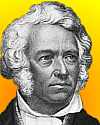
On 2 Aug 1788, Leopold Gmelin was born, a German chemist, who published Gmelin's Handbuch der Anorganischen Chemie (Handbook of Inorganic Chemistry), later expanded to organic chemistry, in which he extensively covered the known facts of chemistry. In his lifetime he produced over a dozen volumes. The first was released in 1817.
This was such a valuable resource, even after his death it continued to be updated. Also, the full work was published in an English translation.
See this obituary for background on this remarkable chemist, Leopold Gmelin.

On 2 Aug 1820, John Tyndall was born, the British physicist who demonstrated why the sky is blue. But worked in a broad field of scientific interests which embraced heat, light, sound, glaciers and much more. Today's book pick is: A Vision of Modern Science: John Tyndall and the Role of the Scientist in Victorian Culture (Palgrave Studies in the History of Science and Technology), by U. DeYoung Tyndall’s contributions to the conduct of science in his era were so significant that it is a pity he is now so little recognized for his influence. His campaign to free science from the restraints of theology caused a national uproar, and in his popular books and lectures he promoted scientific education for all classes. In his efforts to create an authoritative role for scientists in society, he played a pivotal role in Victorian history.
It is available from Amazon, typically about New from $72.11. Used from $45.52. (As of earlier time of writing - subject to change.)
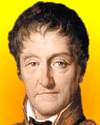 | When a body acts upon another one, it is always immediately or through some intermediate body; this intermediate body is in general what one calls a machine. |
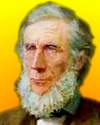 | Every occurrence in Nature is preceded by other occurrences which are its causes, and succeeded by others which are its effects. The human mind is not satisfied with observing and studying any natural occurrence alone, but takes pleasure in connecting every natural fact with what has gone before it, and with what is to come after it. |
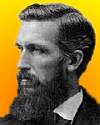 | “In the beginning God created the heaven and the earth…” Whatever our speculations may be in regard to a “beginning,” and when it was, it is written in the rocks that, like the animals and plants upon its surface, the earth itself grew. |
| Before you look at today's web page, see if you can answer some of these questions about the events that happened on this day. Some of the names are very familiar. Others will likely stump you. Tickle your curiosity with these questions, then check your answers on today's web page. | |
| Births | |
 | On 2 Aug 1835, Elisha Gray, an American inventor who would have been well-known for his invention if another person had not got to the patent office before him earlier that same day to file on a similar device. A famous legal battle still did not gain priority for Elisha Gray. So it is another man’s name that is associated with the invention that was was destined to be in most people’s houses. Can you name the invention? |
 | John Tyndall, born on 2 Aug 1820, was an Irish physicist who became known to the scientific world in 1848 as the author of a substantial work on Crystals. He studied the acoustic properties of the atmosphere and the blue colour of the sky. What explanation did he give for the blue color of the sky? |
| Deaths | |
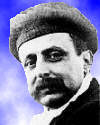 | Louis Blériot (1872-1936) was a French aviator who was the first person to fly across a certain body of water on 25 Jul 1909, winning a £1,000 prize offered by the owner of the Daily Mail newspaper. Over which body of water did he make his prize-winning flight? |
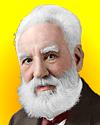 | A Scottish inventor (1847-1922) had a career which was influenced by his grandfather (who published The Practical Elocutionist and Stammering and Other Impediments of Speech), his father (whose interest was the mechanics and methods of vocal communication) and his mother (who was deaf). This background set his course in developing the transmission of voice over wires. Can you name this man? |
| Events | |
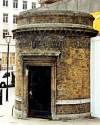 | On 2 Aug 1870, Tower Subway, the first tube railway in the world, was opened under the River Thames in London, England. Engineer James Henry Greathead used a tunnelling shield he modified from Barlow's design to bore the 6-ft diameter tunnel near the Tower of London. A 12-seat carriage shuttled from end to end. It was not successful due to low use and frequent breakdowns, and the railway closed within three month. How was the carriage powered? |
 | On 2 Aug 1938, a new product, Dr. West’s Miracle-Tuft toothbrush, was described in a New York Times business report. The Weco Products Company, was the first to use a new material for the bristles, for which they promised “No bristle shedding, 100 per cent waterproofed, longer life, greater cleansing power.” Competition came in May 1939, as Johnson & Johnson began advertising their new Tek toothbrush. What was the older bristle material that this new toothbrush replaced, and what was the new bristle material? |
Fast answers for the previous newsletter for August 1: isotopic tracer techniques • Joseph Stalin • Joseph Montgolfier • Hitler, offended by a Nobel Peace Prize to another person in a Nazi concentration camp, required all Germans to decline any Nobel award. • Oscar Hammerstein and Oscar Hammerstein II • metre • Oak Ridge, Tennessee • Jeep.
 If you enjoy this newsletter, the website, or wish to offer encouragement or ideas, please send feedback by using your mail reader Reply button.
If you enjoy this newsletter, the website, or wish to offer encouragement or ideas, please send feedback by using your mail reader Reply button. Your click on a Facebook, StumbleUpon, or other social button on the site webpages is also a welcome sign of appreciation. Thank you for using them.
© This newsletter is copyright 2020 by todayinsci.com. Please respect the Webmaster's wishes and do not put copies online of the Newsletter — or any Today in Science History webpage. (If you already have done so, please remove them. Thank you.) Offline use in education is encouraged such as a printout on a bulletin board, or projected for classroom viewing. Online, descriptive links to our pages are welcomed, as these will provide a reader with the most recent revisions, additions and/or corrections of a webpage. For any other copyright questions, please contact the Webmaster by using your mail reader Reply button.
--
If you do not want to receive any more newsletters, Unsubscribe
To update your preferences and to unsubscribe visit this link
Executive Real Estate Business Class
-
"It was like a man with wings. It wasn't like anything you'd see on TV or in a monster movie." ...
About the publisher
Search This Blog
Blog Archive
-
▼
2020
(1542)
-
▼
August
(192)
- HISTORY: Lessons from the latest March on Washington
- New This Week on History News Network
- Discover lost cities with Nat Geo History. Subscri...
- On This Day for August 31 - Confederates evacuated...
- Newsletter for Monday 31 August.
- Face Masks Make you dumb (compliant) Economic des...
- August 31: Malaya Gains independence, Princess Dia...
- FAMILY: How to get your kid to wear a mask
- Roman numerals | Ancient empires | The battle of C...
- On This Day for August 30 - Historic spaceflight b...
- Newsletter for Sunday 30 August.
- August 30: Crossbow Outlawed, Nehru Requests Indep...
- The Compass: London
- On This Day for August 29 - New Orleans hit by Hur...
- Newsletter for Saturday 29 August.
- August 29: Treaty of Nanking, Second Battle of Bul...
- CORONAVIRUS UPDATE: These promising treatments are...
- PHOTOGRAPHY: Lives that matter, from the pietà to ...
- The Horrifying True Story Behind "Candyman," The Y...
- The Roundup Top Ten from History News Network
- On This Day for August 28 - Civil rights march on ...
- Newsletter for Friday 28 August.
- August 28: Tom Thumb Races a Horse, Scientific Ame...
- ANIMALS: When baby wombats become your roommates
- Give your kids the world! Subscribe now.
- Create remote resiliency with Britannica Kids
- On This Day for August 27 - The death of Titian, M...
- Newsletter for Thursday 27 August.
- Lockdown for you but not for the politically corre...
- August 27: Krakatoa Erupts and the End of Lord Mou...
- YOUR WEEKLY ESCAPE: Inside the world of transhuman...
- SCIENCE: Behind the hurricanes, wildfires, and bla...
- Demystified: What Does Gaslighting Mean?
- The Latest News from History News Network
- On This Day for August 26 - Joan of Arc's arrival ...
- Newsletter for Wednesday 26 August.
- Fear fatigue is more dangerous than COVID-19 plus
- August 26: Longbows, Cannons and Morris Mini-Minors
- For Your Eyes Only: America’s Spying Secrets
- 50+ Vintage Pictures Of Your Parents Being Cooler ...
- TRAVEL: Waiting for a silver lining
- On This Day for August 25 - Paris liberated, Sean ...
- Newsletter for Tuesday 25 August.
- August 25: French Arrive in Louisiana, James Cook ...
- HISTORY: Why the U.S. Postal Service matters
- Even Life-Long Learners Need Back-to-School Savings!
- Experience a 360-degree virtual tour of the Nat Ge...
- New This Week From History News Network
- On This Day for August 24 - Eruption of Mount Vesu...
- Newsletter for Monday 24 August.
- GeoEngineering Massive Drought WildFires + More Ma...
- August 24: Alaric I Sacks Rome, British Capture Wa...
- FAMILY: How you can support your kid's teachers—an...
- Genghis Khan | Edward the Confessor | The Spanish ...
- On This Day for August 23 - William Wallace execut...
- Newsletter for Sunday 23 August.
- August 23: 1st US Women's Rights Convention, Bin L...
- The Compass: U.S. National Parks
- On This Day for August 22 - Wars of the Roses ende...
- Newsletter for Saturday 22 August.
- August 22: Wars of the Roses Ends, Chennai Founded...
- CORONAVIRUS UPDATE: Your employer could require yo...
- PHOTOGRAPHY: Capturing a muted Russia
- The Unsung Heroes Who Fought For Women's Voting Ri...
- The Roundup Top Ten from History News Network
- On This Day for August 21 - French defeated at the...
- Newsletter for Friday 21 August.
- YOUR WEEKLY ESCAPE: A million people live in under...
- August 21: Mona Lisa is Stolen, the 50th US State ...
- ANIMALS: Soft and virus-y, the mink with COVID-19
- On This Day for August 20 - Viking 1 launched, Eer...
- Total Exposé! Watch the 2nd Plandemic Movie "InDoc...
- Newsletter for Thursday 20 August.
- August 20: The Dutch East India Company, Sun Yat-s...
- A Champion Will Be Crowned on 'Forged in Fire' Ton...
- SCIENCE: The robots have arrived
- The Latest News from History News Network
- On This Day for August 19 - Attempted coup against...
- Newsletter for Wednesday 19 August.
- August 19: Cease-Fire in the Iran-Iraq War and Gor...
- TRAVEL: Will new tech make flying safer now?
- Sail along with Ancient Explorers w/ Nat Geo History!
- On This Day for August 18 - Nineteenth Amendment r...
- Newsletter for Tuesday 18 August.
- August 18: Wilson's Ill-fated Neutrality, American...
- HISTORY: Breaking 'substantial barriers' with Kama...
- New This Week On History News Network
- On This Day for August 17 - Indonesia's declaratio...
- Newsletter for Monday 17 August.
- State of Tennessee orders Home visit checks on ALL...
- August 17: Division of Korea, Indonesian Independe...
- FAMILY: Preparing for this unusual school year
- Medieval baby names | Attila the Hun | Pederasty i...
- On This Day for August 16 - Leonel Fernández Reyna...
- Newsletter for Sunday 16 August.
- August 16: Deadly Chaos in Calcutta and the Last C...
- The Compass: New Zealand
- On This Day for August 15 - Independence for India...
- Newsletter for Saturday 15 August.
- August 15: The Mayflower Sets Sail, Indian Indepen...
-
▼
August
(192)
-
Blogroll
-
About
HistoryFact










0 comments:
Post a Comment